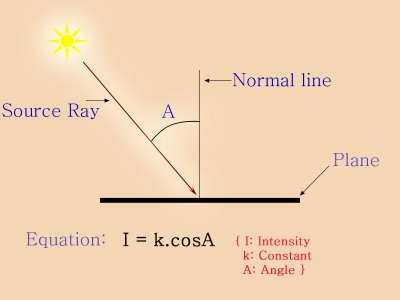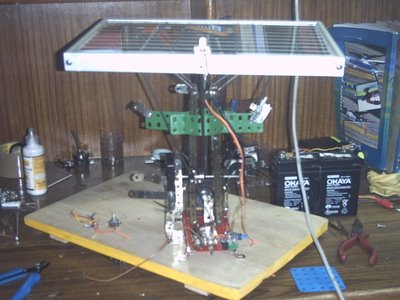Knowing Sun Tracker
Sun Tracker, as the name says, is a device that helps a Solar Device { it can be a cell, panel, or dish...etc.} keep track of the Sun from morning to evening.
But there is lot more to know than just this!
Sun Trackers are generally not used for simple solar panels but they're absolutely essential for a solar power plant.
But, if you believe me, Sun Tracker can help increase overall efficiency of a solar installation by over 40%
And I proved it and made a simple device to show the effect. It helped me bag Intel Science Talent Award 2004.
So, lets start with the basics;
How it increases efficiency?
Common sense tells us that when an object faces the sun directly, it receives more heat. Try it! Face your left palm in the direction of sun on a sunny day, you'll feel heat, and now turn your hand clockwise, what do you feel?
Similarly, when a Solar cell faces the sun, intensity of light falling on it is maximum. There is a mathematical law associated with this, called Lambert's Cosine Law, which says that intensity of light falling on a plane is directly porpotional to the cosine of the angle made by the direction of the source to the normal of the plane. See below;
Similarly, when a Solar cell faces the sun, intensity of light falling on it is maximum. There is a mathematical law associated with this, called Lambert's Cosine Law, which says that intensity of light falling on a plane is directly porpotional to the cosine of the angle made by the direction of the source to the normal of the plane. See below;

From the Equation, it can be understood that when the angle is '0 degree' i.e. when sun is directly overhead, magnitude of the equation is maximum as "cos 0 = 1"
It follows that if we somehow keep the panel aligned with the sun, we'll operate our solar panel on maximum light possible all the time. Thus, compared to a fixed panel, we'll get more power from a tracker equipped panel. This is what I proved in the Science Fair, ~45% increase in power.
It follows that if we somehow keep the panel aligned with the sun, we'll operate our solar panel on maximum light possible all the time. Thus, compared to a fixed panel, we'll get more power from a tracker equipped panel. This is what I proved in the Science Fair, ~45% increase in power.
How does it work?
I made an Intelligent Electronic 2-Axis Tracker. 2-axis means in addition to normal morning to evening movement, it also takes into account seasonal movement of the Sun i.e. north-south movement.
I'll explain the basic circuit here;
To sense the position of Sun in the sky, two light sensors {called LDR} are used, in the following configuration; left side of the picture shows two orange colored sensors mounted on sensor-board. Right side describes the case when Sun's position shifts.

Clearly, you can see that when the position of Sun shifts, one sensor comes in the shadow of the opaque object. When there is less light on the sensor, its electrical resistance increases. Now here, left side sensor's resistance increases and the right one remains the same. This change is detected by an Electronic Circuit which then moves the sensor board {here clockwise} so that once again both the sensors are equally exposed. This way, it corrects itself continuously. And the output from the circuit is used to control a Solar panel, using DC Motors.
As I made it... (click for larger view in a new window)

How much does it cost?
You'll be surprised to know that actually you save quite a lot of money by using this. As I've told earlier, there is 40% gain in efficiency, that means you'll get 40% more power by paying the same price.
Let's suppose that I want 1000W power from Solar installation,
Case I: Cost(I) = Rs.200/W($4.50) [multiply] 1000 = Rs. 200000 ($4500)
Case II: I buy a Sun Tracker worth around Rs.5000 ($ 112) , and get 40% more power. To get the same energy output as earlier, I need a solar panel with 40% less power output, i.e. 600 Watt power panel.
So, Cost(II) = Rs 200/W [multiply] 600 = Rs. 120000 ($ 2700) [plus] Rs. 5000 ($112) = Rs. 125000 ($2812)
Comparing,
Following Case II, I save Rs. 75000 ($1688) , These savings include the cost of tracker!
Isn't that lots of money??
But why it isn't widely used then?
Because, it is difficult to install on roof tops, rotating space is required! But, it can be used on Street Lights. I proved in the science fair that it has potential and moreover, for small applications like street lights, tracker needn't be too much accurate, cost of tracker can be kept down.
See, even if we take worst case scenario, the cost of tracker can never come anywhere near the huge savings we get by reducing power of Solar panels.
For home systems, there is a new idea see here
Why these are essential in Solar Power Plants?
Solar Power Plants generally use concentrating mechanisms to get intense sunlight used for producing power. Concentrators focus sunlight on a point. To maintain focus, a concentrator needs to be accurately aligned with Sun, all the time. Without sun trackers, they cannot focus sunlight and are rendered useless.
Didn't understand something? Need more data? Do you know more? You like it?
Tell me! Click on 'comments' below, provide your feedback, Now!




